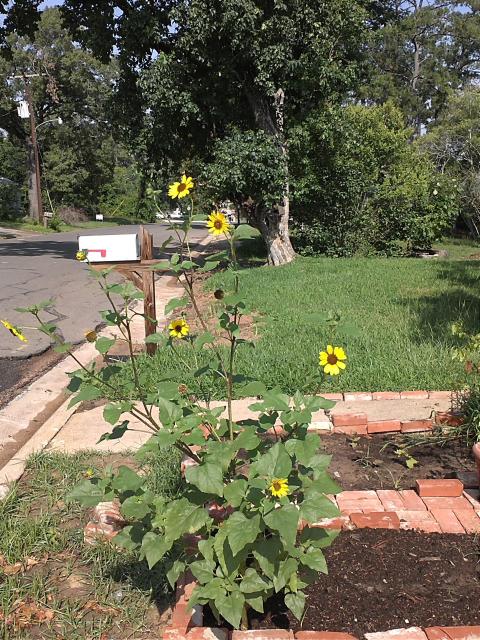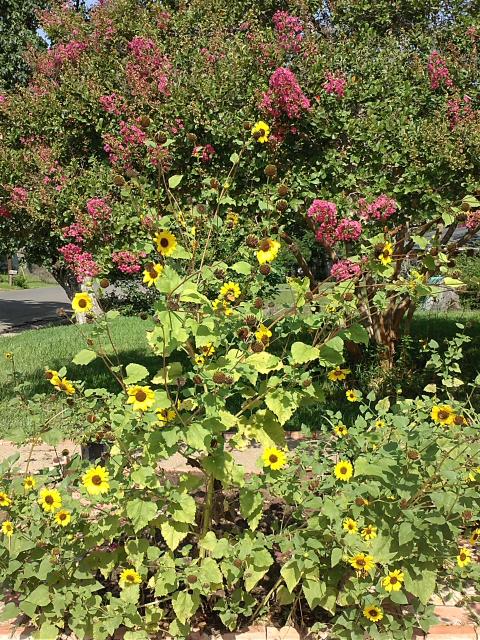baymule
Sustainability Master
Here is our sunflower "weeds"






I'm not sure if the "yard" you mention is an area you're trying to cultivate. And I have no idea how large the yard is.Hinotori said:Pretty much my whole yard is the worst. Marsh grasses, daisy, buttercup, dandelion, clover, dock, rose, blackberry, willow, and everything else is minor.
I think I hate the willow the most.
I suggest you don't do that! a rotovator is going to chop and spread those roots. Most will start new plants.... Best generally available rootacide Round-up by Monsanto.Joel_BC said:I'm not sure if the "yard" you mention is an area you're trying to cultivate. And I have no idea how large the yard is.Hinotori said:Pretty much my whole yard is the worst. Marsh grasses, daisy, buttercup, dandelion, clover, dock, rose, blackberry, willow, and everything else is minor.
I think I hate the willow the most.
If I were trying to cultivate it to something productive, and if it's large enough, I might be tempted to use (or hire) a tractor and rotovator. In a lot of situations that could be described in the way that you've described your yard, a rotovator would be useful to dislodge the roots of the rose, blackberry, willow, and marsh grasses. I'd think the other weeds you mention are be more amenable to ordinary hand weeding tools.
After rotovating the tough stuff, an ongoing cultivation with a rototiller or even just with shovels, trowels, and garden claws would probably be enough.
Just some thoughts (not knowing the situation).
People are free to decide which way they want to go, of course. My own experience with rotovating and rototilling is that most viable roots then wind up being accessible to me (in soft, loosened soil) with a hoe, garden claw, or trowel. I work this way (with my wife as partner in the process) on 5000 sq ft of vegetable-garden soil.~gd said:I suggest you don't do that! a rotovator is going to chop and spread those roots. Most will start new plants.... Best generally available rootacide Round-up by Monsanto.Joel_BC said:I'm not sure if the "yard" you mention is an area you're trying to cultivate. And I have no idea how large the yard is.Hinotori said:Pretty much my whole yard is the worst. Marsh grasses, daisy, buttercup, dandelion, clover, dock, rose, blackberry, willow, and everything else is minor.
I think I hate the willow the most.
If I were trying to cultivate it to something productive, and if it's large enough, I might be tempted to use (or hire) a tractor and rotovator. In a lot of situations that could be described in the way that you've described your yard, a rotovator would be useful to dislodge the roots of the rose, blackberry, willow, and marsh grasses. I'd think the other weeds you mention are be more amenable to ordinary hand weeding tools.
After rotovating the tough stuff, an ongoing cultivation with a rototiller or even just with shovels, trowels, and garden claws would probably be enough.
Just some thoughts (not knowing the situation).
Geneally they WILL eat your garden. They earned their rep In the CROP fields. When given the chance to eat anything they perfer tender grass then young tender broadlleaf weeds BUT they will at least sample the crop [will you miss 2 or 3 cotton plants pot of a 110 acre field?] The trick in a crop field is to keep them moving move their water bucket because they drink a lot,donrae said:Yeah, I've been wondering how the geese work weeding the garden. I'm growing a typical summer garden here--tomatos, squashes, peppers, beans, cukes. I also have raspberries and will be moving my asparagus out there. So, can I use geese to weed? Won't they eat my seedlings, or how long do I have to wait before I put the geese on? I've wondered how they don't damage the garden?